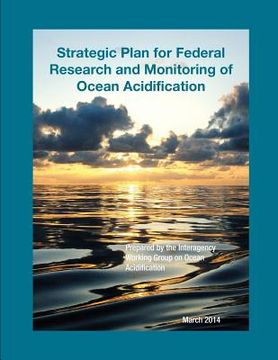Strategic Plan for Federal Research and Monitoring of Ocean Acidification (en Inglés)
Reseña del libro "Strategic Plan for Federal Research and Monitoring of Ocean Acidification (en Inglés)"
Human industrial, transportation, and agricultural activities have caused global atmospheric concentrations of carbon dioxide (CO2) to increase from a pre-industrial average of 280 parts per million (ppm) to the current value of approximately 400 ppm (IPCC AR5 2013). Atmospheric CO2 concentrations are now higher than experienced on Earth for more than 800,000 years (Lüthi et al. 2008), and the rate of CO2 release into the atmosphere is likely unprecedented in Earth history (Kump et al. 2009; Hönisch et al. 2012). Ocean carbonate chemistry is a natural buffering system, but this buffering capacity is being compromised as a direct result of CO2 absorption by the oceans and to a lesser extent by the absorption of nitric acid(HNO3) and sulfuric acid (H2SO4) at the sea surface (Doney et al. 2007). The oceans have absorbed approximately half of the anthropogenic CO2 emissions from fossil fuel use and cement manufacturing over the past 200 years (Sabine et al. 2004). This oceanic uptake of CO2 causes changes to ocean chemistry (Figure 1), including decreases in pH and carbonate ion (CO32-) concentrations, collectively known as global ocean acidification (Figure 2). Since the beginning of the industrial revolution, this uptake has caused a lowering of the surface ocean pH globally from about 8.2 to 8.1 (Caldeira and Wickett 2003; Feely et al. 2004; Caldeira and Wickett 2005; Feely et al. 2009), which corresponds to a 26% increase in hydrogen ion concentration, (H+, acidity). Reconstruction of past sea surface conditions suggest surface ocean pH has not been this low for at least 2 million years (Hönisch et al. 2009). Orr et al. (2005) predicted an additional decrease in average global ocean surface pH of 0.3 to 0.4 pH units over the 21st century. As a consequence of ocean acidification, the chemistry of the oceans is presently changing at a rate exceeding any known to have occurred for at least the past 20 million years (Feely et al. 2004).It is not presently known how the changes in seawater chemistry due to ocean acidification will affect marine organisms and ecosystems, though potential responses of some organisms have been examined and, based on current information, changes in marine ecosystems appear to be likely (Raven et al. 2005). Some organisms appear to be particularly sensitive, while others are not (Doney et al. 2009; Ries et al. 2009). Ocean acidification can negatively impact organisms that use calcium carbonate (CaCO3) to build their shells or skeletons (e.g., corals, marine plankton, and shellfish) because it reduces the availability of carbonate ions, which play an important role in shell formation (calcification). Changes in CO2 and pH can impact other physiological processes as well, affecting species growth, survival, fertilization, embryonic/larval development, and behav-ior (Fabry et al. 2008; Pörtner 2008; Doney et al. 2009). There will likely be ecological "winners" and "losers" as a result of ocean acidification, causing shifts in the structure and composition of marine food webs and ecosystems.

